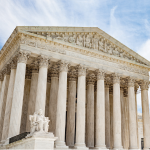WASHINGTON (Reuters)—U.S. Supreme Court justices on Wednesday struggled over whether to speed up the time it takes to bring to the market copycat versions of biologic drugs, expensive medicines that can generate billions of dollars in sales for drug makers.
The nine justices heard arguments in an appeal by Novartis AG of a lower court decision that prevented the Swiss pharmaceutical company from selling its biosimilar version of California-based Amgen Inc’s $1-billion-a-year Neupogen (filgrastim) until six months after the Food and Drug Administration approved it.
The ruling in the case, due by the end of June, could determine how quickly patients have access to near-copies of biologic drugs called biosimilars at potentially cheaper prices.
The case involved a section of the 2010 Affordable Care Act, dubbed Obamacare, that created an expedited path for regulatory approval of biosimilar drugs.
The justices tried to make sense of the complex law and how Congress intended to balance the patent rights of brand-name manufacturers and the ability of biosimilar drug makers to bring copycat products to the market.
Justice Stephen Breyer expressed frustration, wondering why federal regulators did not give the industry more guidance, calling the law’s technical provisions ambiguous.
Rising drug prices are a matter of concern for patients and policymakers. President Donald Trump has said he is developing a plan to encourage competition in the pharmaceutical industry and bring down drug prices.
Unlike traditional drugs, biologics are made inside living cells and cannot be copied exactly to make generic versions. Insurers expect biosimilars to be cheaper than original brands, like generics.
Novartis unit Sandoz in September 2015 began selling Zarxio (filgrastim-sndz), the first biosimilar to win regulatory approval in the United States. Amgen’s Neupogen and Zarxio boost white blood cell counts in cancer patients to help fight infections.
After launch, Zarxio cost 15 percent less than Neupogen at list prices, according to Novartis.
Amgen sued Sandoz in 2014 in San Francisco federal court alleging patent infringement and violations of the Affordable Care Act provision governing biosimilars. The companies disagreed on how to apply that law’s requirement that a biosimilar drug maker give the brand-name manufacturer 180 days notice before launching its copycat version.
In July 2015, the U.S. Court of Appeals for the Federal Circuit in Washington ruled that the 180-day notice must be given after FDA approval.
Novartis appealed to the Supreme Court, saying the Federal Circuit improperly gave the brand-name manufacturer an extra six months of exclusivity on top of the 12 years already provided for under the law, driving up healthcare costs.

